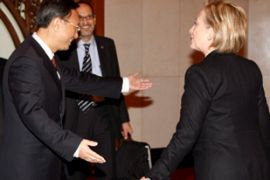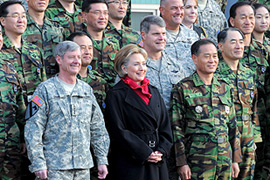Economy tops Clinton’s China agenda
Financial crisis, climate change and North Korea take precedence over human rights.

Melissa Chan, Al Jazeera’s correspondent in Beijing, said the global financial crisis would be high up on the agenda as “the economies [of the two countries] are very closely tied and both of them are struggling”.
For his part, Yang said the world faced a series of “major and pressing” challenges.
“The larger situation requires our two countries to strengthen dialogue … and work together to elevate our relationship to a new level,” he said.
Clinton later met Hu Jintao, the Chinese president, and Wen Jiabao, the prime minister.
First trip abroad
Clinton’s visit to China is the fourth and final leg of a tour of Asia that has also taken her to South Korea, Indonesia and Japan.
It is her first trip abroad as secretary of state.
Before leaving Seoul on Friday for Beijing, Clinton said: “Now, that doesn’t mean that questions of Taiwan, Tibet, human rights, the whole range of challenges that we often engage on with the Chinese, are not part of the agenda.
“But we pretty much know what they are going to say.”
Human Rights Watch said in a statement that those comments undermined human-rights reform in China and sent the wrong message to the Chinese government.
The US has long accused China of human-rights abuses and pressed Beijing to grant greater autonomy to Tibet.
In a 1995 speech in Beijing, Clinton herself openly criticised the country’s human-rights record.
Climate importance
Clinton has stressed the importance of dealing with climate change with China, which has overtaken the US as the world’s leading emitter of greenhouse gases.
Advocacy groups and think-tanks have urged the US and China to jointly develop technologies to cleanly use and store the emissions from burning coal, a major source of energy for both countries.
“So many of the opportunities for clean energy, technology and the like are going to come out of this region of the world,” Clinton said.
“Japan, South Korea and China are uniquely situated to be part of the answer to the problem of global climate change.
“How we engage them, particularly China, is going to be an incredibly important part of our diplomatic outreach.”
Nuclear disarmament
On security and counterterrorism, Clinton said she would be looking for Beijing to take a more active role in convincing North Korea to return to nuclear disarmament talks and ease tensions between Pyongyang, Seoul and Tokyo.
High on the agenda is how to get North Korea to fulfil its commitments to dismantle its nuclear-arms programme.
 |
| Visiting South Korea, Clinton told the North to ‘stop insulting and refusing dialogue’ [EPA] |
Clinton announced the appointment of Stephen Bosworth, a career diplomat, as the new US envoy to replace Christopher Hill to the six-nation talks.
“What will China be willing to do with respect to the six-party talks and their bilateral relationship with North Korea?” Clinton said.
Earlier, after holding talks with Yu Myung-hwan, her South Korean counterpart, Clinton urged the North to honour its previous commitments.
“We maintain our joint resolve to work together and through the six-party talks to bring about complete and verifiable denuclearisation of the Korean peninsula,” she told a joint news conference on Friday.
Washington would not change its policy on Pyongyang as long as it continued “insulting and refusing dialogue” with Seoul, Clinton said.